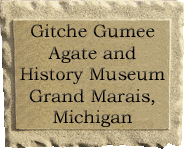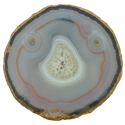MINERAL OF THE MONTH
June 2010 – Nantan Meteorite

A meteorite is a piece of a meteor that reaches the earth’s surface. Most of the meteorites found today were not witnessed when they fell. The Nantan meteorite fall is an exception. In May of 1516 during the reign of the Chinese Emperor Zhengde, the meteor hit the atmosphere above the Nantan province of China and broke into thousands of pieces that ranged in size from .35 ounces to 4,400 pounds. It is thought that the total weight of the meteor before it broke apart was around 20,900 pounds! The meteorite pieces were spread over an area that is approximately16 miles long and five miles wide.
A few years ago it was much easier to purchase Nantan meteorite specimens. Today they are very expensive costing around a dollar a gram. The one pictured below was acquired at the Denver Gem and Mineral Show around ten years ago. It weighs a little over one pound. Most of the Nantans that you see for sale are heavily oxidized. This is because large portions of the meteor was composed of iron oxide (rust) and not iron. By contrast this specimen came from the core of the meteor and is composed of approximately 98 percent metal. In addition to 92 percent iron and 6 percent nickel, more than ten minerals have been found in the Nantan meteorites including kamacite, taenite, plessite, scheribersite, triolite, graphite, spherlite, sideroferrite, dyslytite, cliftonite, and lawrencite. The Widmanstattern cross-banded woven pattern that is typical in iron meteorites is obvious in polished Nantan pieces.
What is interesting about these meteorites is that no one paid attention to them until 1958 when China needed a lot of steel to push the country a "Great Leap Forward". During this period, everyone was told to look for iron ore. Farmers knew about the iron rocks and had found that they were so pure that they could not be melted in a regular fire. They reported the specimens to the government and scientists were able to prove that the "iron ore rocks” were in fact iron meteorites.
P.S.—I didn’t realize until today that I featured Kentucky agate twice in the last few months as the selected mineral. Chalk it up to having too many things to do and not enough time to do them. I apologize for the duplication.
Mineral of the Month Archives
May 2007: Rainbow Fluorite
June 2007: Lake Superior Michipicoten Agate
July 2007: Labadorite
August 2007: Rain Flower Agate
Fall 2007: Malachite
December 2007: Nepheline Syenite
January 2008: Native Copper
February 2008: Amazonite
March 2008: Lake Superior Agate
April 2008: Shadow Agate
May 2008: Apohpylite
June 2008: Ocean Jasper
Summer 2008: Marra Mamba Tiger's Eye
September 2008: Mohawkite
October 2008: Mexican opal
November 2008: Prehnite
December 2008: Picture Jasper
January 2009: Sea Shell Jasper
February 2009: Polychrome Jasper
March 2009: Selenite Desert Rose
Spring 2009: Coyamito Agate
July 2009: Obsidian Needles
August 2009: Goethite
September 2009: Banded Iron Formation
Fall 2009: Fairburn Agate
March 2010: Fossilized Dinosaur Bone
April/May: 2010 Kentucky Agate
June 2010: Nantan Meteorite
July 2010: Mookaite Jasper
Aug/Sept 2010: Polyhedroid Agate
Fall 2010: Ammonite Fossil
September 2011: Petoskey Stones
Spring 2011: Petrfied Wood
Winter 2011: Argentina Condor Agate
January 2012: Mary Ellen Jasper
March 2012: Mexican Crazy Lace Agate
June 2012: Moqui Marbles
September 2012: Chlorastrolite Greenstone
March 2013: Jacobsville Sandstone
August 2013: Unakite
November 2013: Skip-an-Atom Agate
April 2014: Tiger's Eye
September 2014: Black Corundum
February 2015: Condor Agate
June 2015: Petoskey Stone
November 2015: Slag
June 2016: Lake Superior Copper Replacement Agates
March 2017: Chert
July 2017: Kona Dolomite
December 2017: Septarian Nodule
Copyright All rights reserved.
Gitche Gumee Museum.
E21739 Brazel Street
Grand Marais, Michigan 49839





